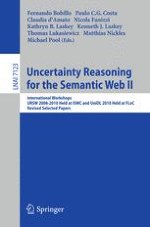2013 | OriginalPaper | Chapter
Probabilistic Ontology and Knowledge Fusion for Procurement Fraud Detection in Brazil
Authors : Rommel N. Carvalho, Shou Matsumoto, Kathryn B. Laskey, Paulo C. G. Costa, Marcelo Ladeira, Laécio L. Santos
Published in: Uncertainty Reasoning for the Semantic Web II
Publisher: Springer Berlin Heidelberg
Activate our intelligent search to find suitable subject content or patents.
Select sections of text to find matching patents with Artificial Intelligence. powered by
Select sections of text to find additional relevant content using AI-assisted search. powered by
To cope with citizens’ demand for transparency and corruption prevention, the Brazilian Office of the Comptroller General (CGU) has carried out a number of actions, including: awareness campaigns aimed at the private sector; campaigns to educate the public; research initiatives; and regular inspections and audits of municipalities and states. Although CGU has collected information from hundreds of different sources - Revenue Agency, Federal Police, and others - the process of fusing all this data has not been efficient enough to meet the needs of CGU’s decision makers. Therefore, it is natural to change the focus from data fusion to knowledge fusion. As a consequence, traditional syntactic methods should be augmented with techniques that represent and reason with the semantics of databases. However, commonly used approaches, such as Semantic Web technologies, fail to deal with uncertainty, a dominant characteristic in corruption prevention. This paper presents the use of probabilistic ontologies built with Probabilistic OWL (PR-OWL) to design and test a model that performs information fusion to detect possible frauds in procurements involving Federal money in Brazil. To design this model, a recently developed tool for creating PR-OWL ontologies was used with support from PR-OWL specialists and careful guidance from a fraud detection specialist from CGU. At present, the task of procurement fraud detection is done manually by an auditor. The number of suspicious cases that can be analyzed by a single person is small. The experimental results obtained with the presented approach are preliminary, but show the viability of developing a tool based on PR-OWL ontologies to automatize this task. This paper also examplifies how to use PR-OWL 2.0 to provide a link between the deterministic and probabilistic parts of the ontology.
